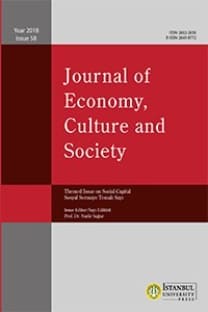Postseküler ve Siyasalı Yeniden Düşünmek
The Postsecular and Rethinking the Political
he notion of postsecularity has come to the fore in recognizing theneglected significance of religion and belief in terms of their normative,social and political contributions to the individual and collective livesof contemporary times. The literature of postsecularism, essentially,takes issue with the normative-political problematique of coexistenceof diverse beliefs in the political community. In this respect, JürgenHabermas joins the term of postsecular consciousness to be able to dealwith the persistence of religiousity and faith in modernized societies andseeks ways to include religious reasoning and moral intuitions into thepublic sphere and will-formation of the political community. However,he ends up restricting religious moral and political contribution strictlyto the general public sphere and ultimately civil society. This articleargues that the inadequacy of his postsecular orientation has to do withhis idea of the political, which ignores contestation and pluralization inrelation to the very foundations of the political. The article also claimsthat the postsecular turn in political theory fulfills its promises, if it opensthe relationship between the secular/immanence and the religious/transcendence to diverse/plural interpretations, and simultaneouslycontest the political as ontology among subjects of diverse beliefs in thepolitical community.
___
- Asad, T. (2003). Formations of the Secular: Christianity, Islam, Modernity. Stanford, USA: Stanford University Press.
- Bruce, S. (2002), God is Dead: Secularization in the West. Oxford, UK: Blackwell Publishing.
- Bruce, S. (2008). Secularisation and Politics. In Jeffrey Haynes (Ed.), Routledge Handbook of Religion and Politics (pp.145 –158). London, UK: Routledge.
- Calhoun, C., Juergensmeyer, M., & VanAntwerpen, J. (Eds.) (2011). Rethinking Secularism. Oxford, UK: Oxford University Press.
- Casanova, Jose (1994). Public Religions in the Modern World. Chicago, USA: Chicago University Press.
- Casanova, J. (2007). Rethinking Secularization: A Global Comparative Perspective. In Peter Beyer&Lori Beaman (Eds.), Religion, Globalization and Culture (pp.7—22). Leiden, Holland: Brill.
- Casanova, J. (2008). Public Religions Revisited. In Hent de Vries (Ed.), Religion: Beyond the Concept (pp. 101-120). New York, USA: Fordham U.P
- Casanova, J. (2011).The Secular, Secularizations and Secularisms. In Craigh Calhoun, Mark Juergensmeyer&Jonathan VanAntwerpen (Eds.), Rethinking Secularism (pp. 54 –74). Oxford, UK: Oxford University Press,.
- Connolly, W. E. (1995). The Ethos of Pluralization. Minneapolis, USA: University of Minnesota Press.
- Dallmayr, F. (2012). Post-secularity and (global) Politics: a Need for Radical Redefinition. Review of International Studies, 38 (5), 963 –973. https://doi.org/10.1017/S0260210512000423
- De Vries, H., & Lawrence F. S. (Eds.) (2006). Political Theologies: Public Religions in the Post-Secular World. New York, USA: Fordham University Press.
- Habermas, Jürgen (1992). Postmetaphysical Thinking: Philolophical Essays. Massachusetts, USA: The MIT Press.
- Habermas, Jürgen (2002). Religion and Rationality: Essays on God, Reason and Modernity. Cambridge, UK: Polity Press.
- Habermas, J. (2006a). On the Relations between the Secular Liberal State and Religion. In Hent De Vries & Lawrence F. Sullivan (Eds.), Political Theologies: Public Religions in the Post-Secular World (pp.251-261). New York, USA: Fordham University Press,
- Habermas, J. (2006b). Religion in the Public Sphere. European Journal of Philosophy, 14 (1), 1–25. https://doi. org/10.1111/j.1468-0378.2006.00241.x
- Habermas, Jürgen (2008a). Notes on Post-Secular Society. NPQ, Fall, 17–29.
- Habermas, Jürgen (2008b). Between Naturalism and Religion (Ciaran Cronin, Trans.). Cambridge, UK: Polity Press.
- Habermas, Jürgen (2010). A Postsecular World Society: On the Philosophical Significance of Postsecular Consciousness and the Multicultural World Society. 1–13. Retrieved from https://tif.ssrc.org/wp-content/ uploads/2010/02/A-Postsecular-World-Society-TIF.pdf (access date: 20.08.2017).
- Habermas, Jürgen (2011). The Political: The Rational Meaning of a Questionable Inheritance of Political Theology. In Mendiate, Eduardo & Jonathan VanAntwerpen, The Power of Religion in the Public Sphere (pp. 15–34). New York, USA: Columbia University Press,
- Honneth, A. (2014). The Fredom’s Right: The Social Foundations of Democratic Life ( Joseph Ganahl, Trans.). Cambridge, UK: Polity Press.
- Hurd, Elizabeth (2008). The Politics of Secularism in International Relations. Princeton, USA: Princeton University Press.
- Marchart, Oliver (2007). Post-Foundational Political Thought: Political Difference in Nancy, Lefort, Badiou and Laclau. Edinburgh, UK: Edinburgh University Press.
- Mendiate, E., & Jonathan VanAntwerpen (Eds.) (2011). The Power of Religion in the Public Sphere. New York, USA: Columbia University Press.
- Mouffe, Chantal (2006). Religion, Liberal Democracy and Citizenship”, In Hent De Vries& Lawrence F. Sullivan (Eds.), Political Theologies: Public Religions in the Post-Secular World (pp. 318–326). New York: Fordham University Press.
- Rawls, John (2005). Political Liberalism. New York, USA: Columbia University Press.
- Taylor, Charles (2004). Modern Social Imaginaries. North Caroline, USA: Duke University Press.
- Taylor, C. (2007). A Secular Age. Cambridge, USA: Harvard University Press.
- Taylor, C. (2011). Why We Need a Radical Redefinition of Secularism. In Eduardo Mendiate &Jonathan VanAntwerpen(Eds.), The Power of Religion in the Public Sphere (pp.34–59). New York: Columbia University Press.
- White, Stephen K. (2009). Violence, Weak Ontology and Late-Modernity. Political Theory, 36 (7), 808–816. https:// doi.org/10.1177%2F0090591709345464.
- ISSN: 2602-2656
- Yayın Aralığı: Yılda 2 Sayı
- Başlangıç: 1960
- Yayıncı: İstanbul Üniversitesi Yayınevi
